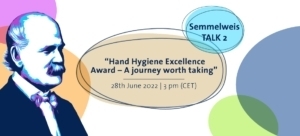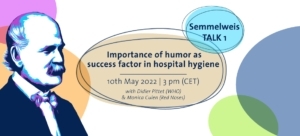The coronavirus as a teacher for hygiene measures
More than 300 interested persons from all over the world gathered in front of their screens on March 10 to follow the first digital event of the Semmelweis foundation. The event highlighted the learning processes and effects the pandemic has had on hospital hygiene.
At Semmelweis Digital, experts from the CEE region explained their strategies for combating the coronavirus in hospitals in the best possible way and provided an outlook on possible further waves of the virus. In addition, each presentation and discussion addressed the question of what impact the coronavirus may have on the overall situation in hospitals and care facilities – especially with regard to hygiene measures.
For example, Bernhard Küenburg, president of the Semmelweis foundation, is certain that, even if the coronavirus has been combated, the current and unprecedented attention to hand hygiene measures must be exploited. Didier Pittet, head of the Department of Hospital Hygiene at Geneva University Hospitals, honorary president of the Semmelweis foundation and initiator of the WHO’s “Clean Care is Safer Care” program, strongly affirms the question of whether cleaner hospitals equate to safer hospitals as well.
One of the most important findings of the event is that hygiene measures, which have been more widely adopted as a result of the pandemic, should be maintained to move closer to the Semmelweis foundation’s long-standing goal of improving hospital hygiene. The experts agree that prevention and hygiene are the be-all and end-all and that the pandemic may bring about a rethinking of hygiene measures. Markus Müller, Rector of the Medical University of Vienna, pointed out that, in a way, the coronavirus also acts as a teacher: It not only shows that hygiene measures need to be taken more seriously, but also that training and curricula in the medical field need to be continuously adapted to the current requirements.
Another interesting aspect consists in the fact that, according to one study, multi-drug resistant organisms (MDROs) were less prevalent during the second wave of the pandemic than before. This could also be related to improved hospital hygiene or hygiene in general.
For years, the Semmelweis foundation’s goal is creating and strengthening the public awareness for the need for properly applied hospital hygiene. Strong improvements in hygiene standards are already evident: For example, this year Villach Hospital was the first hospital in Austria to submit an entry for the “Hand Hygiene Excellence Award”, as Elke Schindler from Villach Hospital reported. In addition, the event showed what other possibilities to improve hospital hygiene exist. In the area of hand disinfection, for example, there are always new findings. A study not only examined how well hospital employees apply hand hygiene, but also found out that there is an optimal amount of disinfectant to use.
Speaking about the topics of the Semmelweis foundation, “Antimicrobial Stewardship” should not be missing – HAI is the silent pandemic that we should not ignore. The Semmelweis foundation, together with Franz Allerberger, Head of the Public Health Division of the Austrian Agency for Health and Food Safety GmbH, has approached a large number of responsible persons in the CEE countries, who show in a comparative overview how the topic is dealt with in their countries. As in the case of the corona pandemic, we must also face the fight against multi-resistant germs together, because this is one of the threat scenarios that will concern us in the near future.
Click here for the “Antimicrobial Stewardship in Central Eastern European Countries” overview: https://www.springermedizin.de/wiener-medizinische-wochenschrift-1-2021/18848810




